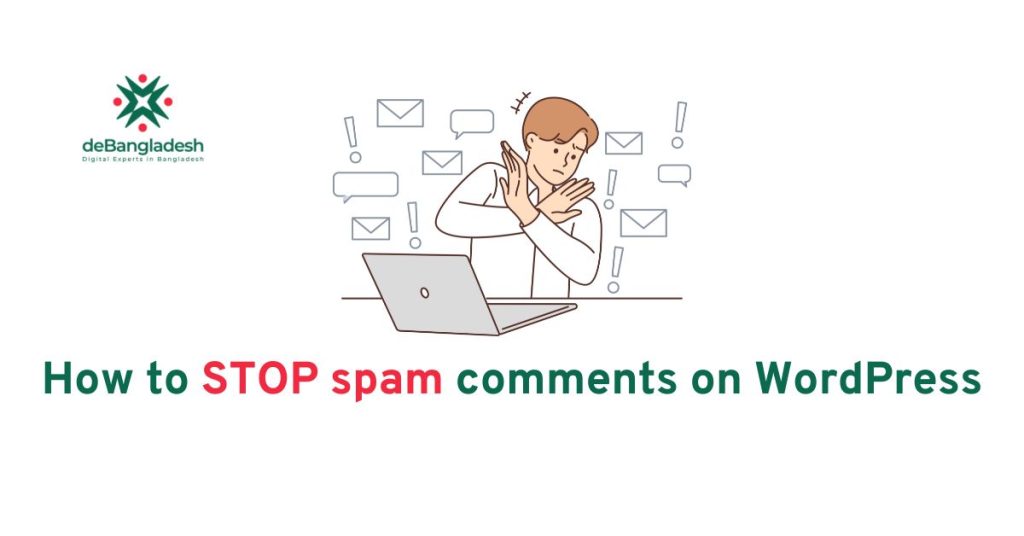To stop spam comments on WordPress, you can use plugins like Akismet or Anti-Spam Bee. These plugins will automatically filter out and block spam comments from appearing on your website.

Spam comments on WordPress can be annoying and time-consuming to deal with. They not only clutter your website’s comment section but also pose a security risk. Fortunately, there are effective ways to combat spam comments and maintain a clean and safe commenting environment.
We will explore some practical solutions to put an end to spam comments on your WordPress site. From utilizing powerful spam-filtering plugins to implementing manual moderation techniques, we’ll cover everything you need to know to keep your comment section free from unwanted spam. Say goodbye to spam comments and welcome genuine engagement and interaction on your website.
Types Of Spam Comments
Spam comments can be a nuisance for WordPress website owners, but there are measures you can take to combat them. Understanding the different types of spam comments is the first step towards stopping them from cluttering your site.
| Type of Spam Comment | Description |
|---|---|
| Keyword-stuffed comments | These comments often contain excessive and irrelevant use of keywords, aiming to improve search engine rankings for certain terms. |
| Generic praise comments | These comments are usually short and generic, with no specific reference to the content of the post. They often include phrases like “great post” or “good job.” |
| Irrelevant promotional comments | These comments are typically advertisements or promotions that are unrelated to the post’s topic. They may contain links to unrelated websites or products. |
To prevent these spam comments, you can implement various strategies such as using anti-spam plugins, enabling comment moderation, and enforcing stricter comment settings. Additionally, regularly monitoring and deleting suspicious or spam-like comments can help maintain the quality and integrity of your website’s comment section.
Understanding The Risks Associated With Spam Comments
Understanding the risks associated with spam comments is essential for anyone using WordPress. Discover effective strategies to prevent spam comments, ensuring a clean and secure website experience for both content creators and readers.
Spam comments can have a negative impact on your website’s SEO. Search engines like Google consider user engagement as an important ranking factor, and spam comments can harm it. When spam comments start flooding your site, it creates a poor user experience and can discourage genuine visitors from engaging with your content.
Moreover, spam comments can damage your reputation. They often contain irrelevant or harmful links that can tarnish your website’s credibility. Visitors may question the authenticity of your content, leading to a loss of trust.
Dealing with spam comments also wastes valuable time on moderation. As a website owner, you have better things to do than sifting through and deleting spammy comments. This time could be better spent on creating new content, engaging with your audience, or working on other important aspects of your business.
1. Captcha Verification

One effective method to prevent spam comments on WordPress is by implementing captcha verification. Google reCAPTCHA is a popular choice for this purpose. By enabling reCAPTCHA on the comment form, you can ensure that only real users are able to leave comments on your website.
ReCAPTCHA works by displaying a challenge to the user, typically a distorted image or a puzzle, that they must complete to prove they are human. This helps to block automated bots from submitting spam comments.
To utilize Google reCAPTCHA on your WordPress site, you can install and activate a reCAPTCHA plugin that integrates seamlessly with your comment system. These plugins provide easy-to-follow instructions for setting up reCAPTCHA on your website.
By implementing captcha verification, specifically utilizing Google reCAPTCHA, you can effectively reduce the number of spam comments on your WordPress site and provide a better user experience for your legitimate visitors.
2. Comment Moderation Settings
Learn how to effectively stop spam comments on WordPress with the help of comment moderation settings, allowing you to maintain a clean and engaging platform for your readers.
To stop spam comments on WordPress, you can adjust the comment moderation settings. By enabling the option to require approval for all comments, you can ensure that no comment gets published without your permission. This way, you can manually review and approve each comment before it appears on your website. Additionally, implementing a blacklist of common spam keywords can help filter out unwanted comments. By specifying certain words or phrases that are commonly associated with spam, you can automatically mark those comments as spam and prevent them from being published. These settings can be easily accessed and modified in the WordPress admin panel, allowing you to have better control over the comments on your website.
3. Commenter Authentication
One effective way to stop spam comments on WordPress is by implementing commenter authentication. This involves enabling user registration and login requirements. By doing so, you can ensure that only genuine and authenticated users are able to leave comments on your website.
There are plugins available that can help you with this process. These plugins offer social media login options, allowing users to authenticate themselves through their social media profiles. This not only adds an extra layer of security but also makes it more convenient for users to log in and leave comments.
4. Utilizing Anti-spam Plugins
One effective way to stop spam comments on WordPress is by utilizing anti-spam plugins. Akismet is one of the most popular plugins for this purpose. To use Akismet, you need to install and activate it on your WordPress website. This plugin helps filter out spam comments by analyzing them against its vast database of known spam comments. In addition to Akismet, there are also alternative anti-spam plugins available that you can explore.
These plugins usually employ various techniques to identify and block spam comments, such as analyzing comment content, IP addresses, and user behavior. They can significantly reduce the number of spam comments you receive, saving you time and effort in managing your WordPress comments section.
5. Implementing Honeypot Technique
To stop spam comments on WordPress, implementing the honeypot technique can be an effective solution. This technique involves adding hidden fields with CSS to trick automated bots into filling them out, thus identifying them as spam
By incorporating this technique, you can detect and block spam based on form submissions. These hidden fields are specifically designed to be invisible to human visitors, making it difficult for bots to identify them as traps.
Once a hidden field is filled out, the form submission can be flagged as spam and filtered accordingly. This provides an efficient way to prevent spam comments from cluttering your WordPress site and ensures a better user experience for genuine visitors.
6. Customizing Comment Forms
One effective way to stop spam comments on WordPress is by customizing the comment forms. A common practice is to remove the URL field from the comment form as spammers often misuse it to promote their websites. By removing this field, you can minimize the opportunities for spammers to leave spam links.
To achieve this, you can utilize comment form plugins that offer customization options. These plugins provide easy-to-use settings or code snippets that allow you to modify the comment form according to your preferences. Look for plugins that specifically mention the ability to remove the URL field in their features or documentation.
Customizing the comment forms not only helps in stopping spam comments but also enhances the user experience by streamlining the commenting process. By removing unnecessary fields, you can create a cleaner and more user-friendly comment form for your WordPress site.
7. Responding To Legitimate Comments
Looking to stop spam comments on WordPress? One effective strategy is to respond to legitimate comments on your site. Engaging with your audience not only fosters a sense of community, but it also discourages spammers from targeting your site.
Encourage Engagement
Engaging with your readers is crucial to building a thriving online community. Encourage genuine engagement by actively responding to legitimate comments left on your WordPress site. When users feel acknowledged and appreciated, they are more likely to continue participating in meaningful discussions. Here are some tips to foster engagement:
- Respond promptly to comments to show that you value your readers’ opinions.
- Ask open-ended questions in your replies to encourage further conversation.
- Express appreciation for the commenter’s contribution, providing positive reinforcement for their engagement.
- Consider featuring standout comments or contributors on your site, showcasing their valuable insights.
By actively engaging with legitimate visitors, you create a positive online environment that discourages spam comments and encourages meaningful discussion.
8. Regularly Updating WordPress And Plugins
One of the most effective ways to stop spam comments on WordPress is to regularly update both WordPress itself and any installed plugins. By staying updated, you ensure that your website has the latest security patches and improvements, reducing the risk of spam comments.
Regularly check for security updates for both WordPress and the plugins you have installed. These updates often include bug fixes and security enhancements that can help combat spam comments. The easiest way to perform these checks is by logging into your WordPress admin dashboard and navigating to the Updates section.
Take advantage of the automatic update feature available in WordPress. Enabling this feature ensures that your WordPress instance and installed plugins are always up to date without requiring manual intervention. To enable automatic updates, you can add the following code to your website’s wp-config.php file:
By following these steps, you can keep your WordPress website up to date and minimize the risk of spam comments.
9. Monitoring And Analyzing Spam Comment Patterns
Reviewing spam comments regularly is vital to effectively stop spam on your WordPress site. By taking the time to go through the comments section, you can identify patterns and trends that can help you further improve your spam prevention measures.
Look for common characteristics among spam comments such as specific keywords, URLs, or email addresses. Highlighting such patterns will allow you to create filters and rules to automatically detect and block similar comments in the future.
Additionally, pay attention to the time of day or week when spam comments are most frequent. By analyzing these trends, you can adjust your comment settings to reduce the likelihood of spam during those periods.
In conclusion, regularly monitoring and analyzing spam comment patterns will enable you to stay one step ahead of spammers and protect your WordPress website from unwanted and potentially harmful content.
Frequently Asked Questions For How To Stop Spam Comments On WordPress
How Do I Turn Off Spam Comments In WordPress?
To turn off spam comments in WordPress, go to the admin dashboard and navigate to Settings > Discussion. Uncheck the option “Allow people to post comments on new articles” and save the changes. This will disable comments from being posted on your website, reducing spam.
How Do I Delete Thousands Of Spam Comments On WordPress?
To delete thousands of spam comments on WordPress, go to the Comments section in your WordPress dashboard. Select the spam comments you want to delete and then choose the “Bulk Actions” option. Click on “Move to Trash” and then “Apply” to delete the spam comments permanently.
Why Am I Getting So Many Spam Comments On My Blog?
Spam comments on your blog are common due to online bots searching for websites to send irrelevant messages. To reduce this, enable comment moderation, use CAPTCHA or anti-spam plugins, and block the IP addresses of frequent spammers. Regularly update your website’s software and plugins to stay protected.
Conclusion
To conclude, there are several effective ways to combat spam comments on WordPress. By implementing strong spam filters and captcha systems, monitoring and moderating comments regularly, and utilizing comment approval settings, you can greatly reduce the presence of spam on your website.
It’s also essential to engage with your audience and encourage genuine interactions to discourage spam bots. Remember, maintaining a clean and engaging comment section contributes to a positive user experience and strengthens your overall website security.




